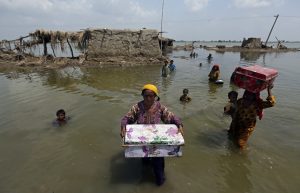One-third of Pakistan is underwater, with at least 33 million people displaced, and over a thousand dead. The survivors now face fresh fears: an impending malaria epidemic, loss of crops, and starvation.
Lives have been changed forever; while the floods are devastating, it is the aftermath that will haunt us for a long time.
But the onus of this climate change-induced disaster is not on Pakistan alone. It is a humanitarian disaster created by years of the world’s richest reaping the benefits of exploiting resources, land, and conquest.
Climate change is inextricably tied to poverty and inequality. And intergenerational impoverishment and environmental wreckage left behind after centuries of colonial rule in South Asia crippled Pakistan’s ability to cope with the current and many other crises to follow.
Estimates put a $45 trillion price on the reparations owed to the states of the former undivided India for the looting of wealth and destruction of a thriving economy that once contributed to 27 percent of the world’s GDP.
But even then, that hefty amount does not account for the mass deforestation carried out for British industries to grow, nor the enrichment of landowners whom the British relied on to maintain their dominance in the region – at the expense of farmers who became poorer and enslaved. Today, the descendants of these aristocrats reside in mansions in cities all over the world, while the mud huts of peasant families have been swept away, leaving them to die in the open.
The injustice did not end with the independence of India and Pakistan, either. Pakistan contributes only 0.4 percent of global carbon emissions, yet the country is paying a colossal price. Pakistan is warming much faster than other nations. By the end of the century, it’s thought the country’s temperature could rise by 4.9 degrees Celsius, more than double the “safe” 2-degree limit. This, as NASA predicted, could make swaths of Pakistan entirely uninhabitable.
So why is Pakistan expected to pay the price of years of injustices from the Global North?
Consider how the United States – the largest polluter in the world – is responsible for a quarter of historical emissions. However, it reaps the benefits of this unabashed exploitation, raking in insurmountable wealth and power while its emissions inflict a shocking $2 trillion worth of damage on poorer countries like Pakistan, where the floods are a direct result of melting glaciers.
Pakistan is home to more than 7,200 glaciers, second only to the Arctic. And they are melting at an alarming rate, turning these giant freshwater reservoirs into deadly floodwater.
And as glaciers melt, not only are ecosystems and industries destroyed, but a major source of freshwater also disappears. While fossil fuels continue to burn, it is only a matter of time before disaster strikes the rest of the world.
Therefore, U.N. appeals for $160 million for Pakistan can hardly be seen as aid. The West should recognize its complicity in climate disasters across the Global South and pay historic reparations amounting to a far larger sum.
But unfortunately, Pakistan – and the entire Global South – continue to be victims of the West’s discriminatory practices – where access to aid and justice is often determined by the color of one’s skin.
Even in the United States, racially skewed climate trauma is evident. In Jackson, Mississippi, residents have been without clean, reliable drinking water for months. This crisis has disproportionately impacted Black and low-income families who are victims of America’s historically discriminatory laws, which forced minority communities into areas vulnerable to climate change and pollution – a phenomenon dubbed “environmental racism.”
But this is only the tip of the iceberg because the hypocrisy is palpable. When Ukrainian refugees fled their war-torn country, the West welcomed them with open arms and pockets. To date, over $100 billion in aid has been sent to Ukraine. The U.S. alone has sent roughly $10 billion to Ukraine, while only promising $30 million to Pakistan – less than a dollar per displaced person.
Considering the richest 1 percent, or developed nations, are responsible for the carbon emissions of more than double the poorer half of humanity, this is no longer about aid – it’s about climate justice.
As such, emergency aid must be viewed as a form of long-overdue climate reparation. This idea must even be central to reaching agreements at the upcoming COP27 Conference. Although climate reparations have been argued for before (just think of the $100 billion promised yet undelivered by the world’s wealthiest nations), this could be an opportunity to set a precedent that could revolutionize climate progress at COP27 and beyond.
But reparations alone will not be enough to fix the gross imbalance between the world’s richest and poorest.
Besides urgently needed aid, the West must acknowledge its complicity and drastically reduce its emissions, investing what they have pledged in climate education and resilience building into the Global South.
Local communities in the Global South are most at risk and therefore require emergency intervention. For instance, in June I took part in a novel religious climate education initiative led by Faith For Our Planet (FFOP), a climate-interfaith NGO, founded and chaired by Dr. Mohammed bin Abdul Karim Al-Issa, Secretary General of the Muslim World League (the world’s largest Islamic NGO). FFOP convened environmental experts, activists, and religious leaders from around the country in order to fill the gaps left by Western ignorance.
By encouraging grassroots religious actors across the Global South and the wider world to prioritize climate action, they can build resilience and lobby for climate change responsive development in their communities.
But to truly repair decades of historic injustice, Western nations must – finally – address the root causes of a disease they created: the legacy of a colonial outlook that gave them justification to exploit, plunder and create the climate catastrophe we see before us.
There is no waiting for a carbon-neutral 2050. Pakistan, the Global South, and then indeed the wider world, may not survive that long.

































